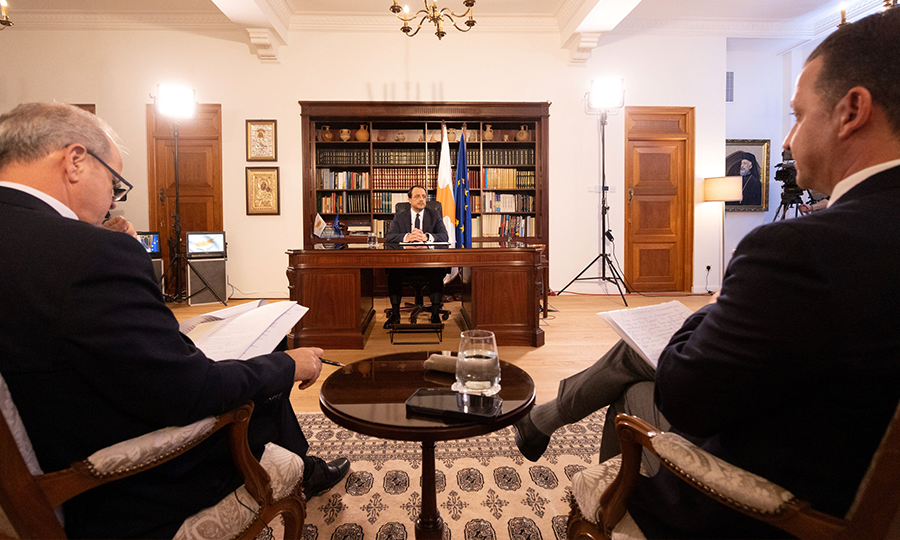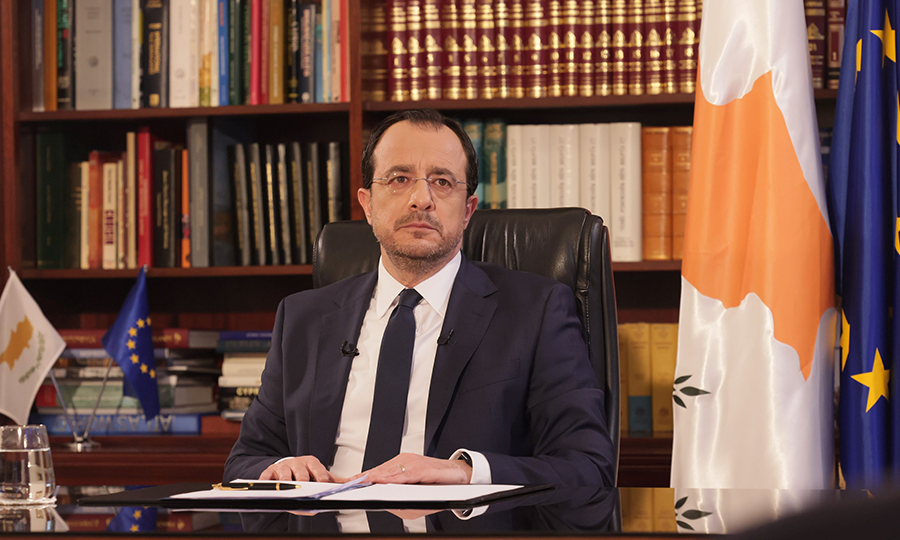

Yiannis Ioannou
In an interchannel interview to evaluate the first year in office, President of the Republic Nikos Christodoulides commenced proceedings a few minutes after 20:30. A nearly 15-minute pre-recorded presentation highlighted the primary accomplishments of the initial 12 months in power. Amid a noticeable decline in the President's popularity, reflected in recent polls, the format closely resembled election debates. News directors from four private stations (ANT1, Omega, Alpha Cyprus, and Sigma TV), along with a journalist from the public broadcaster (RIK), posed questions in a round-robin format with a 6-minute time limit, covering two topics (economy/internal governance and Cyprus/foreign relations). Notably, this interlocution took place at the President's office in the Presidential Palace for the first time.Addressing reactions from the previous days, the interchannel interview faced criticism for excluding media other than television. The Press Editors' Union (PJU) officially reacted to this, as reflected in President George Fragos' post on the X platform. Victor Papadopoulos, the Director of the President's Office, justified this decision on Alpha TV, emphasizing the President's respect for all media. He noted that an inter-channel press conference exceeding an hour and a quarter would not be productive, considering the flow of TV station programs.
The President opted for a predominantly mainstream medium, such as television and television journalists, for his annual report. This decision aimed to address the decline in his and his government's approval ratings over the past months.
Key points:
- President Christodoulides acknowledged mistakes, emphasizing they occurred "at the level of behavior" rather than policy-making. He defended reactions to these mistakes, linking them to the need for institutional reforms. He concluded by asserting that any mistakes did not come at a cost to the people of Cyprus. The President admitted taking polls seriously and reiterated that his presidency lacked support from the two major parties, describing himself as a "party orphan."
- The President defended his government's work on various policies, including the economy, immigration, energy, and institutional reforms. He reiterated the narrative of "social liberalism" to differentiate himself from the major parties.
- The commitment to solving the Cyprus problem took center stage in the thematic second part of the debate. President Christodoulides studiously avoided extensive references to the EU's involvement in the talks, emphasizing adherence to the TDCA and acknowledging the difficulties in the Cyprus problem. When questioned about the European envoy issue, he reiterated the concern about nomenclature but refrained from specifying a name.

The overall interview was conducted in a subdued manner, lacking exciting or groundbreaking revelations. President Christodoulides aimed to convey subtle political signals, especially concerning the intermediate space and the Auditor General. Despite not rejecting the Guterres Framework, he defended the prospect of resuming talks, expressing support for the DIKO initiative. The President sought to rectify his image and address mistakes from the first 12 months of his government with the pre-recorded speech-evaluation. In his responses, he adhered to his familiar communicative style from the pre-election period. Finally, the President expressed regret about excluding media outside of television and reiterated his commitment to a social contract with the people, echoing sentiments emphasized during the election.
[This article was translated from its Greek original and may have been edited for brevity and clarity]































